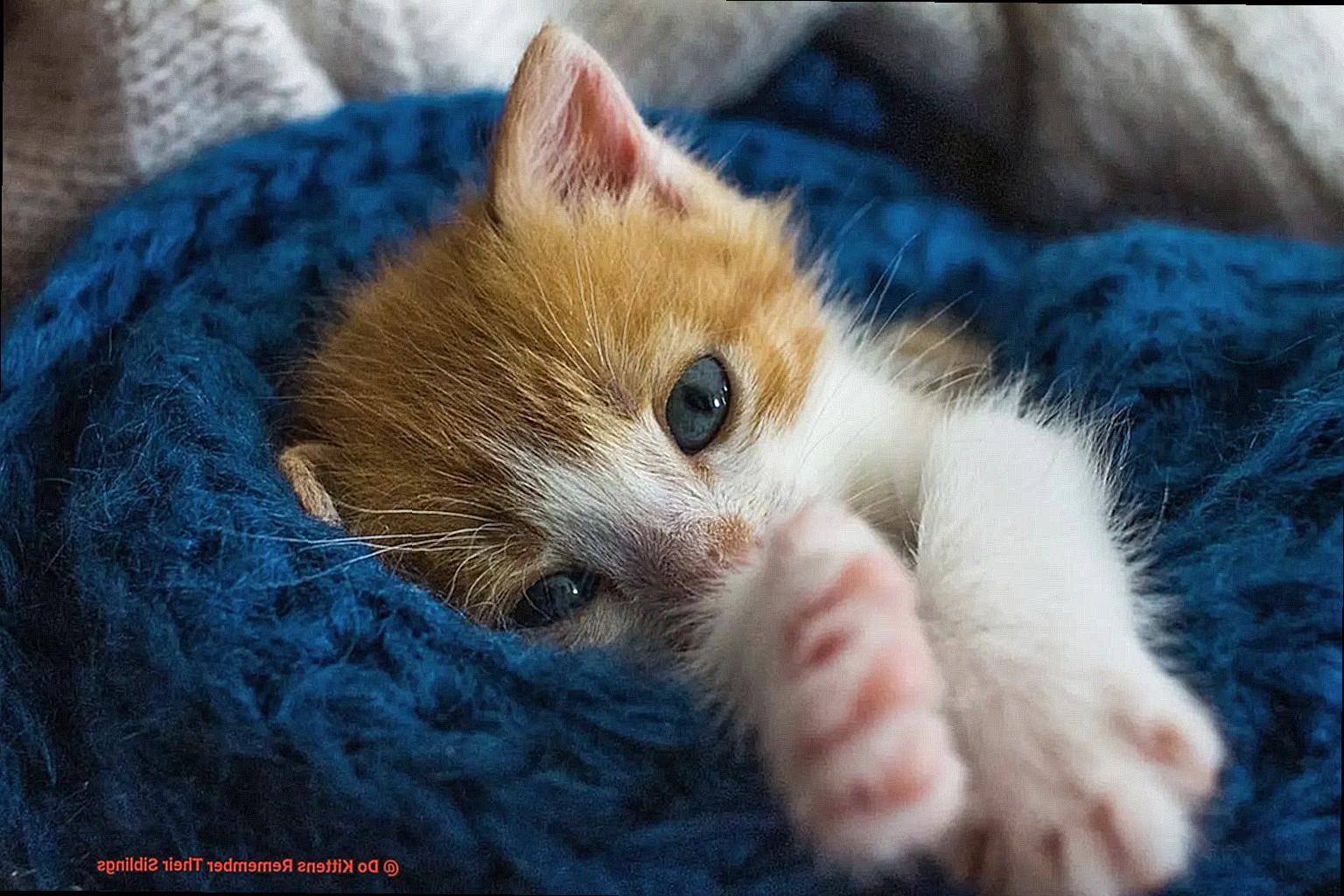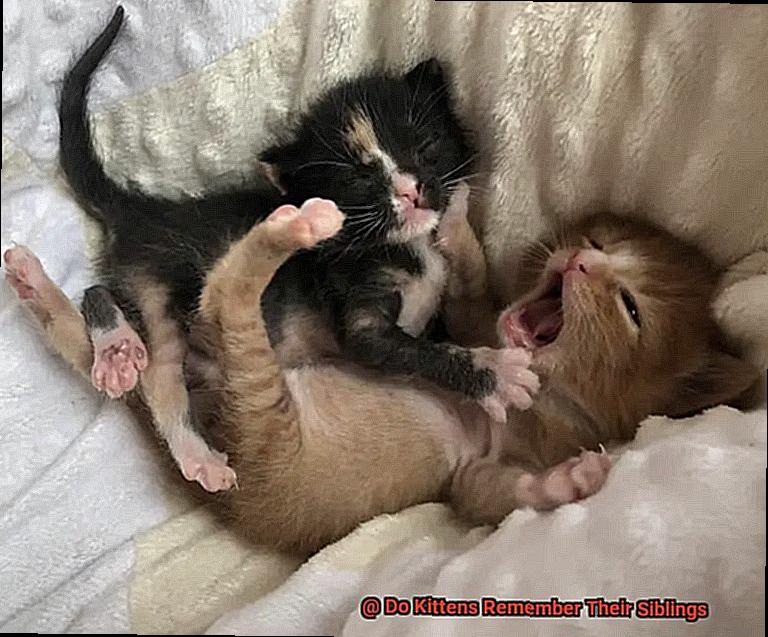Do kittens remember their siblings?
It’s a question that has puzzled many cat owners. The answer may surprise you.
Recent studies show that kittens can recognize and remember their siblings even after long periods of separation. So, if you adopt two kittens from the same litter, there’s a good chance they’ll still recognize each other as family years down the line.
But how is this possible? What sort of memories are cats capable of producing and retaining?
This blog post will explore all these topics and more as we delve into the fascinating world of feline memory. We’ll look at what scientists have discovered about how cats store and recall memories, as well as their ability to form long-term memories.
We’ll also address whether or not cats can form special bonds with their siblings, and if so, what those bonds might look like. Finally, we’ll provide some concrete advice for helping your cats stay connected to their siblings over time.

So, get ready to learn all about Do Kittens Remember Their Siblings.
How Do Kittens Recognize and Remember Their Siblings?
It’s a fascinating question that has been studied for years, with the answer revealing an intricate web of senses used to identify family members.
Kittens rely on smell, sight, and sound to recognize their littermates. From an early age, kittens use their keen sense of smell to detect familiar scents, including those of their mother and siblings.
They can also be identified by physical appearance such as coat color and markings. Additionally, kittens may even recall their siblings’ vocalizations and movements.
Kittens form strong bonds with their littermates from a young age, often snuggling up for warmth and protection. Even after being separated, this bond helps them remember each other for months or even years afterward.
However, as kittens grow into adult cats, they may form new relationships with other cats or animals. Although they may still recognize each other in some way, the relationship between siblings may not be as strong as it once was.
Overall, although memories fade over time, it’s clear that kittens have the ability to detect and recall each other throughout life.
The Role of Early Socialization and Weaning Practices
Raising a litter of kittens is a delicate balancing act between providing them with love and protection while still encouraging their independence.
The early socialization and weaning practices you use can have a huge impact on your kittens’ future behavior, relationships, and overall wellbeing. It’s important to give your kittens plenty of time to bond with their siblings and learn essential social skills such as play, grooming, and communication.
Weaning should begin at around 4-5 weeks of age with the introduction of solid food, and be fully completed by 8-10 weeks old for optimal nutrition and growth. Separating kittens from their siblings too soon can be detrimental to their socialization and emotional development.
Kittens who are taken away from their siblings too early may struggle to form close relationships with other cats or suffer from separation anxiety. On the other hand, keeping kittens together for too long can also lead to negative outcomes. They may become dependent on each other or have difficulty adjusting to new environments or other cats later in life.
Finding the right balance between giving your kittens enough time together while still separating them at the appropriate time is key.
How Long Do Kittens Remember Their Siblings?
Kittens are highly social creatures, so it’s natural to wonder how long they remember their siblings.
The answer is: it varies. Kittens typically stay with their littermates and mother for 12 weeks, during which time they form strong bonds and learn important life and social skills.
Following this period, the strength of kittens’ memories of their siblings can range from a few months to several years. It’s important to note, however, that even if kittens don’t recall their littermates, they have an impressive capacity for adaptation.
With proper socialization during the early weeks of life, kittens can easily form new relationships with other cats and become loving and sociable pets as they grow up.
Are Kittens Sad When They Leave Their Siblings?

This is a common question for many new pet owners, and the answer is not always straightforward.
Kittens are social animals and form strong bonds with their littermates in the early months of life, so it can be an emotional experience for both the kittens and their owners when it comes time to separate them. Kittens may experience a range of emotions when they leave their siblings, from sadness to loneliness to anxiety.
However, these feelings are usually temporary and can be alleviated with patience, love, and proper care. Kittens who have been socialized and raised with their siblings are more likely to adjust more quickly to their new homes.
Do Kittens Care for Their Siblings?
The answer is not as straightforward as one might think.
While some kittens may form strong bonds and display caring behaviors, others may be indifferent or even aggressive towards each other. The level of affection a kitten shows towards its littermates can vary based on several factors, including genetics, early experiences, and individual temperament.
For example, breeds like the Siamese or Ragdoll are known for their social and affectionate nature and may be more likely to form close ties with their siblings. However, even within the same litter, kittens can have vastly different personalities and behaviors towards one another.
Some may engage in play and snuggle together while others prefer to keep to themselves. It’s important to note that caring for their siblings doesn’t necessarily mean that kittens will actively seek out or assist their littermates in times of need; they have a strong instinct for self-preservation which can take precedence over those of their siblings.
That being said, socializing with their siblings during early development can be beneficial for a kitten’s growth and overall well-being. Through play and interaction with each other, kittens can learn valuable social and communication skills which will serve them well throughout life.
The level of care and affection a kitten shows towards its littermates can vary based on individual temperament, genetics, and early experiences.
Do Kittens Mourn their Siblings?
The answer is yes. Kittens are social animals with strong bonds to their littermates, so when one of them passes away or is separated from the others, it can be a traumatic experience for the remaining kittens.
Kittens have an impressive memory and can remember their siblings even after years of separation.
They also recall the scents and sounds associated with their siblings, making them anxious or sad when they are not around. When one kitten leaves the litter, the remaining ones may show signs of distress, such as vocalizing, searching for the missing sibling, or being less active than usual.
These behaviors suggest that kittens do feel a sense of loss and may mourn their siblings in their own way. It’s important to note that mourning behavior can vary from kitten to kitten and may depend on factors such as age, temperament, and the closeness of the bond.
It’s essential to provide them with extra care and attention during these challenging times to help them cope with their feelings and adjust to their new situation.
v0ur4ABbRlY” >
Can Cats Reunite with their Lost Family Members?
The answer is not always straightforward — it depends on a variety of factors, such as the age of the cat when they were separated, how long they have been apart, and if they have had any contact since being separated.
Cats are known for their independent nature, but they do form strong bonds with their family members, including other cats in their litter. Studies have shown that kittens develop strong social ties with their littermates, which can last for months or even years.
If a cat has been apart from their family members for an extended period of time, it may be difficult for them to recognize or remember them. However, cats have a powerful sense of smell and may be able to detect the scent of their relatives.
In some cases, cats may even exhibit signs of mourning if they are removed from their family members. This can include changes in behavior such as loss of appetite, lethargy, or excessive grooming.
But even if a cat is able to recognize their family members, it may not always be wise to attempt to reunite them. Cats are territorial animals and may become aggressive or fearful towards unfamiliar cats or animals.
It’s important to introduce cats slowly and carefully while closely monitoring their behavior to ensure they are getting along.
Also Read: Do Cats Remember Their Parents? – 21Cats.org
Conclusion
In conclusion, cats are incredibly social creatures and can remember their siblings even after long periods of separation.
Their acute sense of smell, sight, and sound, along with the strong bonds formed in the early months of life, enable them to do this. However, if kittens are removed from their littermates too soon, they can form new friendships with other animals or cats.
It’s important to find the right balance between giving your kittens enough time together and separating them at the appropriate time for proper socialization and weaning habits, which will affect their future behavior and health. When it comes to leaving their siblings, kittens may experience a range of emotions from sadness to fear; however, these feelings can usually be relieved with patience, love, and care.
With enough time and patience, kittens can learn how to be single dogs. Also, reuniting cats with their missing family members should be done carefully as cats can become territorial or scared of unfamiliar cats or animals.
To ensure they’re getting along it’s best to introduce them slowly while monitoring their behavior closely.







